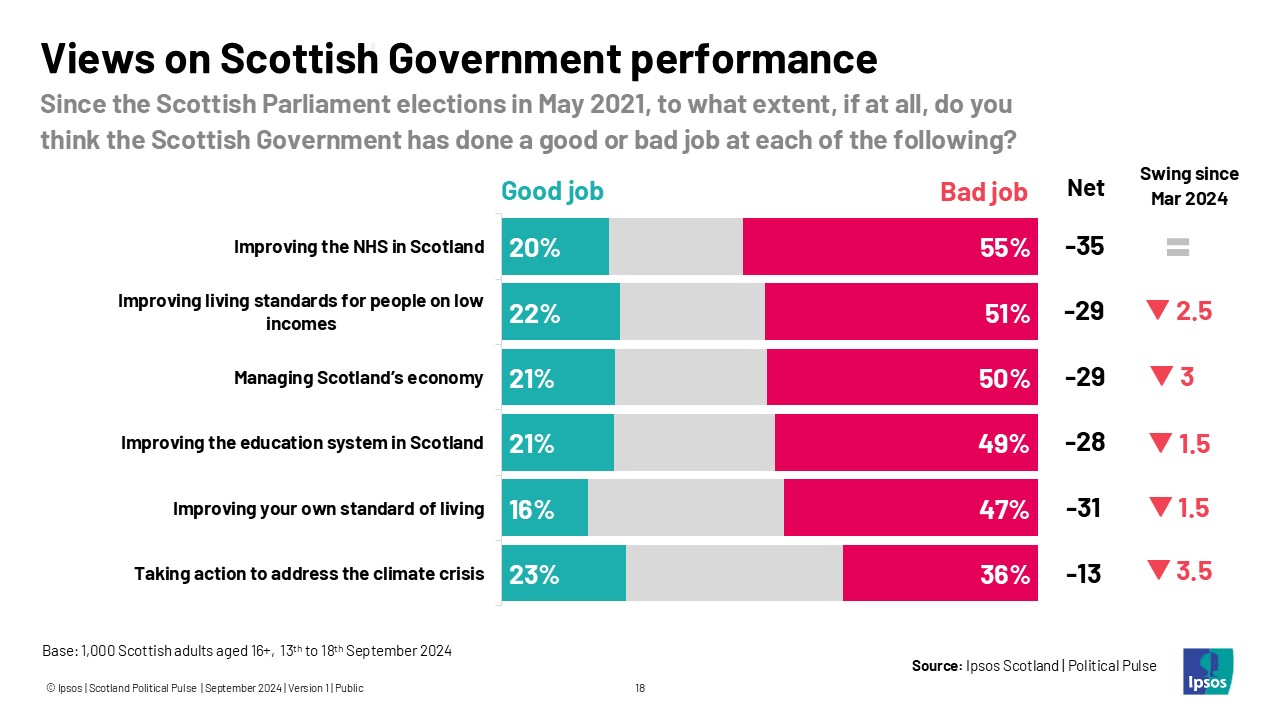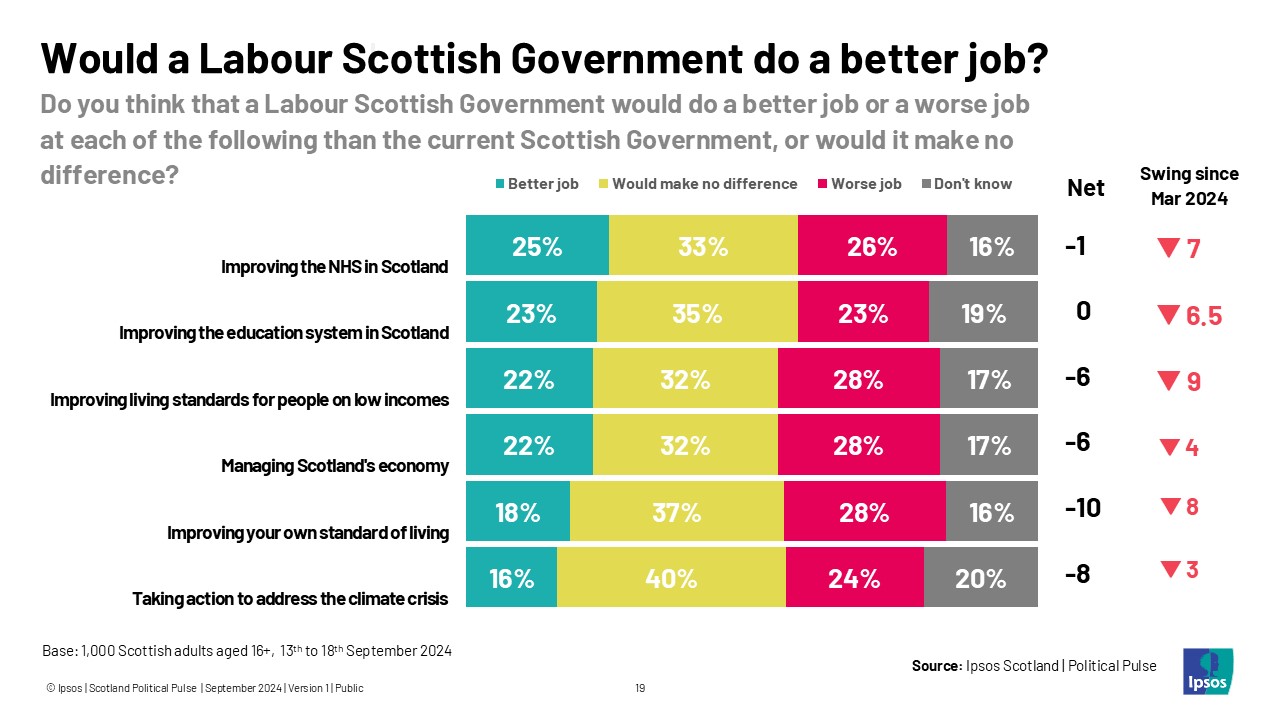Labour’s favourability ratings fall in Scotland
- Over half think the Scottish Government is doing badly on key issues such as the NHS, living standards and the economy - but compared with March, fewer now think Scottish Labour would do a better job.
- 48% of the Scottish public have an unfavourable opinion of Keir Starmer and 40% an unfavourable opinion of Anas Sarwar - the weakest favourability ratings for either politician that Ipsos has yet recorded in Scotland.
- The majority (76%) think Scotland’s economy is in a poor state. They believe multiple factors are to blame: previous Conservative governments’ decisions at Westminster, Brexit, previous SNP-led Scottish Government decisions, and the Covid-19 pandemic.
Is Scotland heading in the right or wrong direction?
The first Scotland Political Pulse since the General Election, taken 13th – 18th September, finds that over half of Scots (54%) think that things in Scotland are heading in the wrong direction. Just under one in five (18%) feel things are heading in the right direction (22% said neither and 6% were unsure). This is the highest proportion of the public who think Scotland is heading in the wrong direction since Ipsos first asked this in October 2022.
Views on the economy
Overall, 76% of the Scottish public say the current state of the Scottish economy is poor, while just 20% say it is good. The public’s outlook for the economy is relatively gloomy – approaching half (46%) think that the general economic condition of Scotland will get worse in the next 12 months, with only 15% expecting that it will improve (29% think it will stay the same, while 10% are unsure).
Those saying Scotland’s economy is in poor shape are most likely to blame the decisions made by former Conservative UK Prime Ministers and Chancellors between 2010 and 2024 (54%), Brexit (53%), and decisions made by former SNP First Ministers and Cabinet Secretaries for Finance between 2011 and 2024 (52%). Those who say that the Scottish economy is in a good state are most likely to credit the productivity of Scottish workers (46%).
Among those who describe the Scottish economy as poor, younger people are more likely to blame external factors such as Brexit (65% vs. 49% for middle and older age groups), and the state of the global economy (50% vs 34% for middle and older age groups). Conversely, older people (55+) are more likely to blame SNP decision-making, both under previous governments (67%) and the current government (47%). Conservative and Labour voters are most likely to blame previous SNP decisions (91% and 60% respectively), whereas SNP voters are most likely to think that decisions made at Westminster have contributed most to the economy being in poor shape (76%).
Neither the SNP nor Labour appear to be instilling economic confidence in the public: 63% are not confident that the SNP has a good long-term economic plan for Scotland (30% confident), and 64% are not confident that Labour has a good long-term economic plan for the UK (27% confident).
Views on the parties and leaders
The Scottish public do not rate any of the politicians asked about in the poll positively. Since becoming Prime Minister, Keir Starmer’s favourability among the Scottish public has fallen to a ‘net’ rating of -23, a -6.5 swing since March, and his lowest personal rating since October 2022. Chancellor Rachel Reeves receives a negative ‘net’ rating of -27, with 17% of the public being favourable towards her and 44% unfavourable.
Scottish Labour leader Anas Sarwar sees his ‘net’ favourability rating fall to -16, a swing of -4.5 since March, and his lowest personal rating since October 2022. The public are also more negative towards the Scottish Labour Party than they were in March, with ‘net’ favourability towards the party falling from -3 in March to -13 in September.
The SNP’s John Swinney and Kate Forbes both receive the highest ‘net’ favourability rating among the public of any of the politicians asked about in the poll, although this is still a negative favourability rating of -11 each. Swinney is marginally more popular than his predecessor, Humza Yousaf, was towards the end of his time as First Minister, with Yousaf receiving a ‘net’ favourability rating of -15 in March.
Ratings of Scottish Government performance
The Scottish Government’s score card among the public is negative across a range of policy areas – more people say the Scottish Government has done a bad job than a good job on all of these, from managing Scotland’s economy to improving the NHS, education and living standards. As was also the case in Ipsos’ previous poll in March, the public’s views are particularly negative in regard to the Scottish Government’s record on improving the NHS in Scotland - 55% say they have done a bad job on this, compared to 20% who say they have done a good job.

However, the public are also now less likely to think that a Labour Scottish Government would do a better job than the current Scottish Government than they were six months ago. Across all policy areas asked about in our poll, the public are most likely to say that a Labour Scottish Government would ‘make no difference’. Public belief that Labour would do a better job at Holyrood than the current Scottish Government has fallen across the board, with significant declines since March in the proportions who say the party would do a better job at:
- Improving living standards for people on low incomes (‘net’ rating of -6, compared to +12 in March)
- Improving their own standard of living (‘net’ rating of -10, compared to +6 in March)
- Improving the NHS in Scotland (‘net’ rating of -1, compared to +13 in March), and
- Improving the education system (‘net’ rating of 0, compared to +12 in March)

Emily Gray, Managing Director at Ipsos Scotland, commented:
In his speech to the Labour Party Conference this week Anas Sarwar set out his ambition for the party to 'finish the job' it started at the 2024 General Election by removing the SNP from power at the next Holyrood elections in 2026. This poll shows Labour still has a long way to go if it is to turn that aspiration into reality. The Scottish public are less favourable towards both Labour leadership and party now compared with six months ago, and currently the majority are not persuaded that Scottish Labour would perform better in government than the current Scottish Government.
However, these findings point to challenges for all Scotland’s political parties – none of the politicians asked about in this poll receive a positive approval rating from the public. The results also make grim reading for the SNP, with the Scottish Government receiving a negative scorecard from the public across key issues such as the NHS, living standards and the economy.
Technical Note
- Ipsos interviewed a representative quota sample of 1,000 adults aged 16+ in Scotland
- The survey took place online between 13th and 18th September 2024
- Data has been weighted to the known offline population proportions
- Where results do not sum to 100%, this may be due to computer rounding, multiple responses, or the exclusion of “don’t know” categories.
- All polls are subject to a wide range of potential sources of error



